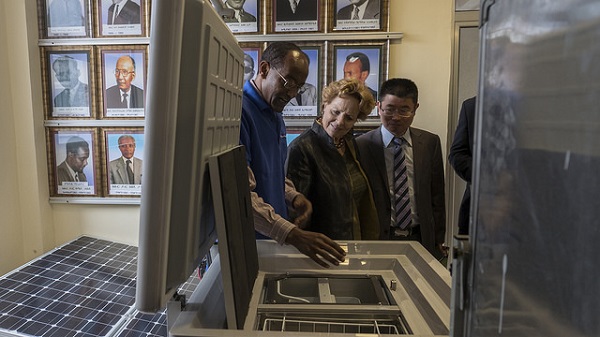
The SDD refrigerators are expected to expand immunization coverage in Ethiopia through significantly reducing the time and resources required for vaccine transportation.
ADDIS ABABA (The Ethiopia Herald)–The Ministry of Health has procured over 6,000 Solar Direct Drive (SDD) refrigerators for health posts and woreda (district) health offices in areas without reliable electricity.
The devices will store vaccines at health facilities which will help keep millions of children alive and healthy. The Federal Ministry of Health fully funded the procurement of these solar refrigerators at a total cost of 31.4 million USD. The procurement was supported by UNICEF given its global expertise in handling such large-scale purchases in a short time.
Prequalified by the World Health Organization (WHO), the SDD refrigerators are expected to expand immunization coverage in Ethiopia through significantly reducing the time and resources required for vaccine transportation. The devices will ensure the availability and safety of vaccines in remote areas where the country’s most vulnerable children live.
The procurement of the SDD refrigerators follows a unique bundled procurement services approach which includes warranty, delivery of spare parts, and training of supply chain and immunization focal persons both at federal and regional levels. In addition, a project management team led by the Ministry of Health and UNICEF will regularly review the progress and efficiency of operations.
At the ceremony, Dr Kebede Worku, State Minister of Health, said, “The Government of Ethiopia underlines its commitment to equip all health posts, health centers and hospitals with optimal cold chain equipment to ensure quality and improve access of the immunization program.”
“The Solar Direct Drive devices we are rolling out are the successful outcome of the strong partnership built between the Ministry of Health, UNICEF and other health partners to ensure that no child is left behind on immunization,” said Ms Gillian Mellsop, UNICEF Representative to Ethiopia.
Immunization is one of the most cost-effective health investments. By protecting children against vaccine preventable diseases, immunization plays a central role in ending preventable child deaths. Despite significant improvements over the past decades, in Ethiopia, only 38.5 per cent of children between 12 and 23 months receive all basic vaccinations. There are also great disparities in terms of access to vaccination services between rural and urban areas.
One of the key strategies to improve access and utilization of immunization services is to improve the cold chain system, especially at health post level. Therefore, the Ministry of Health invested in solar powered refrigerators which are more cost effective and sustainable than refrigerators using gas or kerosene, in remote areas where there is no electricity.
Ethiopia’s Health Sector Transformation Plan (HSTP) has set ambitious goals to improve equity, coverage and utilization of essential health services at all levels by 2020. Achieving these goals will require significant investments, including in innovative technology.
While it remains important to achieve high coverage rates of essential health services, such as immunization of mothers and children, continued efforts are required to provide quality health services to all citizens regardless of differences in socio-economic status or geographic location.
Source: The Ethiopian Herald
